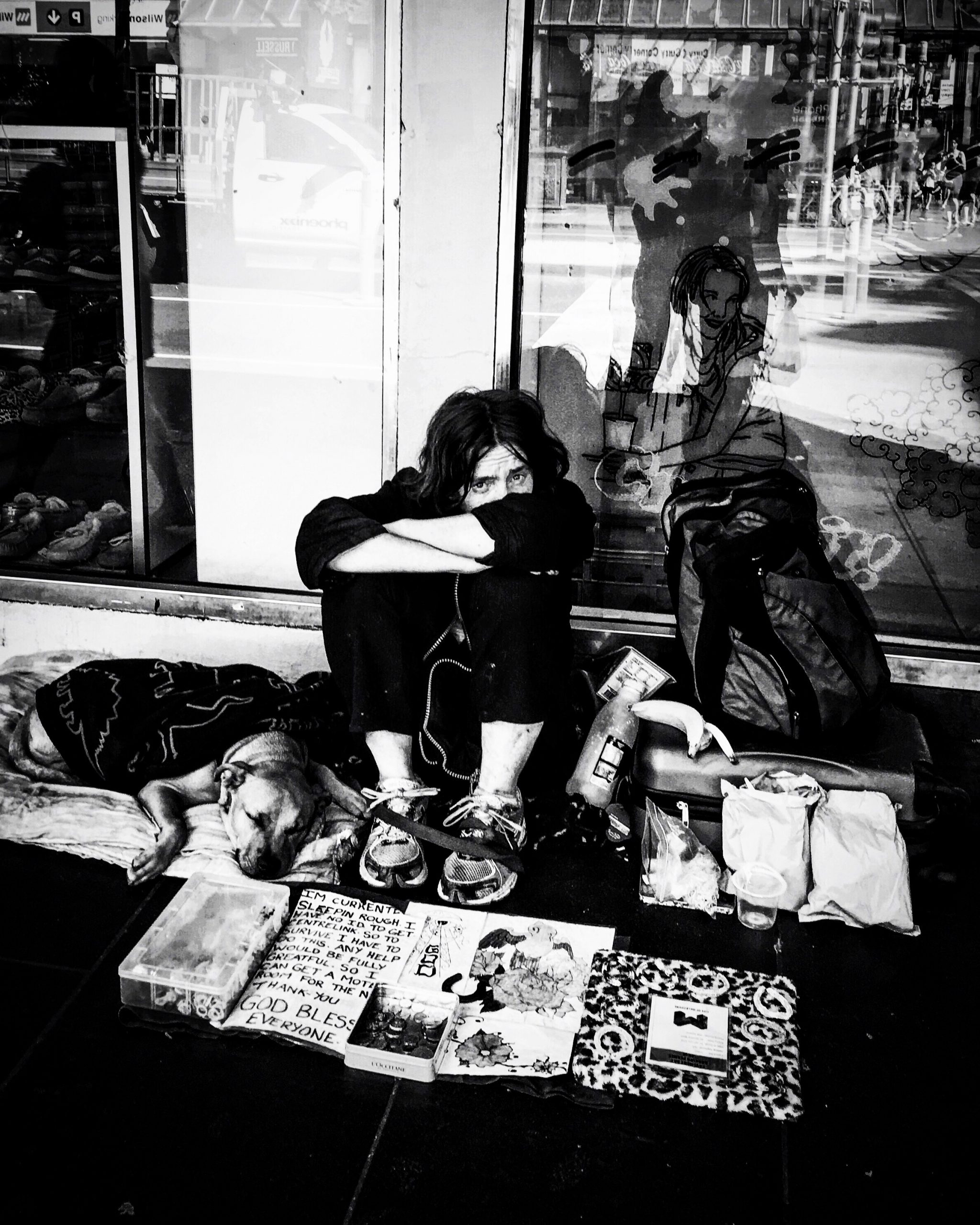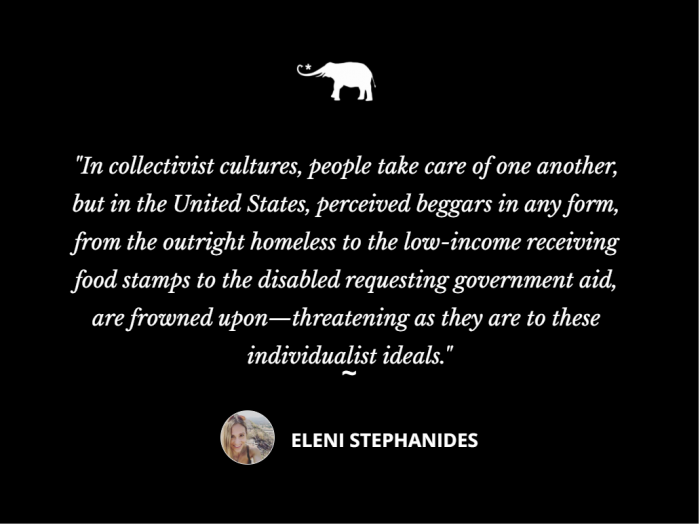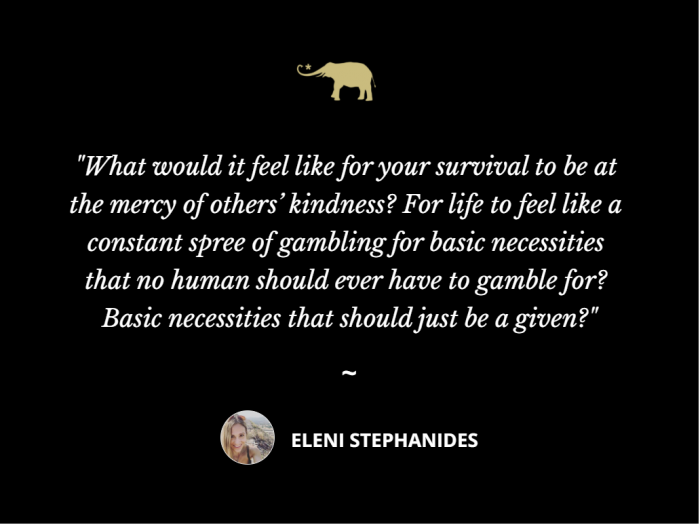 “The willingness to come close to suffering opens us to compassionate action. The nightly news programs are catalogs of the world’s disasters. Are we open to it? Do we actually relate to what we see and hear, or has it all become too depersonalized?” ~ Susan D. Moeller, Regarding the Pain of Others
“The willingness to come close to suffering opens us to compassionate action. The nightly news programs are catalogs of the world’s disasters. Are we open to it? Do we actually relate to what we see and hear, or has it all become too depersonalized?” ~ Susan D. Moeller, Regarding the Pain of Others
“How are we doing? Any donations today? Appreciate your help,” the man outside Arizmendi Bakery reiterates.
Giant headphones hang from his neck, while a black North Face jacket covers his torso.
The people entering and leaving the bakery are mothers, 30-something businessmen, Latinx families, Black women in floral print tops paired with dark blue pants.
Nearby, a pigeon pecks at the handlebars of a teal bike locked to a “No Parking” sign. A toddler in a stroller clumsily picks apart a blueberry scone the size of his head, staring blankly down as golden crumbs drizzle the insides of his shirt.
A few tables away from me, a dog bites into scraps of its owners’ pizza crust that have fallen on the ground.
“A little help today, anything at all,” repeats the man. The words sound more enthusiastic and buoyant after receiving a “yes” or an acknowledgment, wearier and more downtrodden after a handful of successive “no’s” or evasions.
Behind him, cars drive by in a constant stream. Occasionally, one honks at another for stealing the spot they’d been waiting for (parking is coveted on the busy Lakeshore Avenue).
Customers continue to stream in and out through the glass doors: an interracial couple with an enormously fluffy brown and white dog; a 20-something woman in yoga pants with her hair tied up in a high ponytail.
For around every 12 people who walk by pretending they haven’t seen him, one person drops some coins in the man’s paper cup, or hands him food.
“There you go buddy,” says a tall, long-haired Asian guy who looks to be in his late-20s.
Another woman kneels down and asks how he is doing.
This woman offers him pizza. The man declines because he doesn’t have his teeth with him that day “But that pizza’s real good,” he says after thanking her.
I listen for his name. I listen as he tells her that it’s Daniel.
Many of us carry an ingrained idea of what a homeless person looks like: dirty clothes. Rambling speech. Someone whose mind is not quite there, or who perhaps causes us to feel unsafe and guilty at the same time.
Melissa, my Lyft passenger a few weeks after witnessing this scene outside Arizmendi, doesn’t fit this schema. With long, blond hair, tan skin, piercing blue eyes, and a trendy black coat draped over her torso, she looks more like a woman from the pages of Vogue than someone who’d once lived on the streets.
The apartment complex I picked her up in front of was located next to the low-income housing site I used to work at, which was nostalgic for me.
When I tell Melissa I once worked there, the light in her eyes clicks on. She reveals to me that she too once alternated between low-income living and homelessness on the streets of England as a child. She is grateful now that her mom, who dealt with severe mental illness when raising her, is doing better (in the sense that she is both housed and to some extent provided for).
“The shelters in England take proper care of their homeless, so it was a shock to come to San Francisco where the homeless problem is handled so differently. It’s so underfunded, so different than what I was accustomed to back in my country.”
She’s right about this. According to a San Francisco Chronicle editorial, “California is home to 25 percent of the country’s total homeless population and 42 percent of those who are chronically homeless. From 2016 to 2017, the state also saw the largest increase in the number of residents who are homeless—more than 16,000 people.”
Melissa recalls how when she first arrived in San Francisco, it made her sad to see all the unhoused people. She wanted to stop and help each one of them.
“I would walk by a bundle on the street and would want to make sure they were okay. I started realizing there wasn’t enough time in the day to do that for all of them though,” she laments.
After dropping Melissa off, I reflect on how it’s in our nature to assess strangers’ characters through their present actions and behavior, without taking into account the wider context. We may think we have someone pinned, only to watch as little pieces of their past and personal history poke out, complicating and expanding our mental picture.
If there’s one group we’re especially prone to doing this with, I think the homeless population is it.
Watching the interactions outside of Arizmendi, I’m reminded that the homeless bring unwanted thoughts and uncomfortable feelings to the forefronts of sheltered people’s minds.
A substantial portion of us, even those who consider themselves socially conscious and progressive, still seem to tense up when confronted by their presence—even when all they’re doing is minding their own business. We do our best to keep reminders of their plight at bay, even—or especially—when they’re in plain sight.
I’ve heard people write the homeless off as drug addicts, inconveniences, eyesores— in much the same way people talk about trash piles or potholes in the road.
The evasion and dismissal are prompted by a much more complicated mix of emotions than mere apathy or indifference, in my mind.
Is part of it that we’re an individualist culture? In collectivist cultures, people take care of one another, but in the United States, perceived beggars in any form, from the outright homeless to the low-income receiving food stamps to the disabled requesting government aid, are frowned upon—threatening as they are to these individualist ideals.
As Isabel Wilkerson wrote in Caste: “The writer Jonathan Chait noted America’s singular indifference, unique among developed nations, toward helping all of its citizens. He connected this hard-heartedness to the hierarchy that arose from slavery. He found that even conservatives in older wealthy nations are more compassionate than many Americans.”
Maybe it’s that if we’re having a bad day, or are unhappy with our lives for whatever reason, the homeless show us that things could be substantially worse. To fight against the shame of acknowledging this, we might even quietly assign blame to the person for their own predicament, asking ourselves why they haven’t found a more productive endeavor than begging as a means of improving their situation. Believing in simple cause-and-effect narratives to explain our world’s tragedies and hardships is easier on the psyche.
Given my proximity to the man that day outside Arizmendi, I found myself briefly feeling with him the sharp prick left when passersby walked away without a glance or a word. I felt the continual disappointments, which were occasionally and unexpectedly interrupted by momentary relief at the sound of a stranger’s coin clinking against the bottom of the cup.
I wondered what it must be like to subject one’s self to daily indignities and ignominies out of pure necessity, all because the chance of a few responding kindly justifies the effort.
What would it feel like for your survival to be at the mercy of others’ kindness? For life to feel like a constant spree of gambling for basic necessities that no human should ever have to gamble for? Basic necessities that should just be a given?
I consider what it must be like to never have a moment of privacy.
To be at the whims of the weather and the policemen who might usher you along at a minute’s notice. To have to maintain a more or less constant state of vigilance, knowing that every dwelling is transient and none can be safely called your own.
So often we step over a sleeping bundle, not giving a thought to the life they lived or the conditions that led them there.
I wonder what their name is. I’m curious about their past. Do they have family or friends?
What were their dreams? What did they want out of life? Who would they be or what would they be doing right now if the universe had dealt them a better hand?
How often do we allow questions like these to pass through our minds?
There is so much work to be done for the homeless on a systemic level. Specific policies we can vote on, for one. Policies that would require cities like Oroville to have a plan for reaching out to homeless people during disasters. Policies that provide temporary housing.
In addition to the more obvious pains that homeless people suffer through, I can only imagine the low-level, daily, consistent marginalization that compounds them. Basic acknowledgment of one’s humanity is a privilege that we sheltered folks take for granted.
Social pain may be a more subtle, less visible, and obvious one. I’d imagine that the daily acts of invisibilization build up, and though they are small and seemingly inconsequential, they are insidious over time.
When I walk by them now, I try to bring to mind the Susan D. Moeller passage from the beginning of this article. Then I try to hold a little space in my heart. Because before a problem can be tackled more substantially, people have to care. Empathy is the precursor to eventual change.
Homeless people are members of our human family, and it’s far past time that they are recognized and treated as such.













Read 15 comments and reply